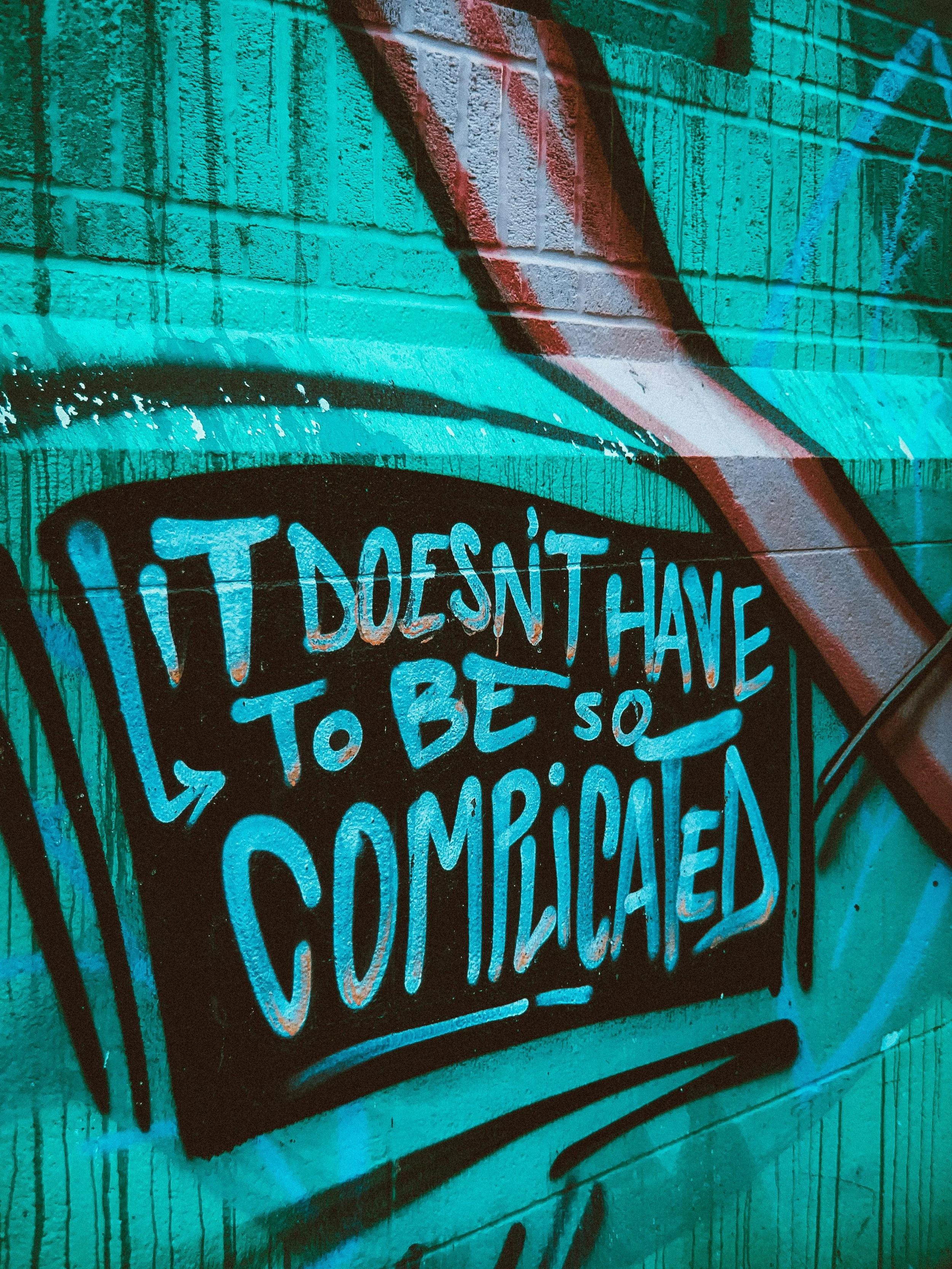Mind Stories and Misperceptions: When Therapists Get Each Other Wrong
/Photo Credit: Elixa Ventur, Unsplash
In a profession built on empathy and communication, it can be understandably painful when that very quality seems to go missing between colleagues. Most of us have experienced the sting of being misunderstood — of having our intentions questioned, our integrity doubted, or our words or behaviors reinterpreted through someone else’s fear, envy or insecurity. It’s disorienting and very hurtful. And because we work in a field where professionalism and personal identity are often intertwined, a rupture with a colleague can feel deeply personal and painful.
The Quiet Pain of Being Misunderstood
When a colleague, especially one that you may consider a friend, or a colleague that you trust, one that you may have supported, cheered on, and encouraged assumes the worst, it is damaging in a way that’s hard to name. You may feel shocked, confused, defensive, unfairly accused, or tempted to withdraw completely. For those of us who give our professional lives to helping others heal, it can be especially painful when the tools we use every day — curiosity, non-assumption, humility, repair — aren’t extended back to us.
Thankfully, this has been a rare occurrence for me in the two decades I’ve been a part of this profession. However, like many of my colleagues, it has happened from time to time. When it does, I have found that it helps to remember that even therapists are human. We all carry our own stories, biases, and wounds. We all have days when we react from a place of insecurity or scarcity rather than compassion and perspective.
The Unspoken Competition in Our Field
While therapy is a calling rooted in service, it’s also a profession that can unintentionally foster comparison and competition: Who’s getting referrals? Who’s speaking at conferences? Who’s publishing a book? Who is gaining social media traction? Call me naivie, but it took me many years to understand that these questions and resentments quietly hum beneath the surface of some collegial relationships.
Unhealthy competition in our field often stems from the illusion of scarcity — the belief that another clinician’s success diminishes our own. From there, it’s a short step to subtle distancing, gossip, or assumptions about motives. It’s not usually malicious (though sometimes it may be); it’s protective. But it’s also destructive to the sense of community and collaboration that our work depends on.
When we forget that there is room for all of us — that each of us brings something distinct and valuable — we drift away from connection and into comparison and unhealthy competition. And this is when mind states begin projecting inaccurate mind stories if we are not careful.
The Stories We Tell Ourselves
In therapy, we talk often about “mind stories” — the quick, automatic narratives our brains create to make sense of something that feels confusing. These stories can show up just as powerfully between colleagues and can sound like:
“She’s trying to outshine me.”
“He doesn’t respect my work.”
“They’re excluding me on purpose.”
”I deserve it more than her!”
”They didn’t invite me because they don’t value me.”
”I am always the one left out.”
These thoughts might pass quickly, or they might take root and harden into conviction. When we’re tired, under pressure, or carrying our own unacknowledged insecurity, it’s easy to forget that these are stories, not facts. Even seasoned therapists — those of us trained to spot projection and cognitive distortion — can fall into the very traps we help our clients dismantle.
The difference lies in whether we pause to examine the story before acting on it. A single moment of curiosity — “Is that true? Or is that my story?” — can be the difference between harmful projection versus staying mindfully present and seeking clarification that is respectful and non assumptive. When we catch ourselves in that moment of awareness, we reclaim choice: the choice to pause rather than react, to reach out rather than withdraw, to check in rather than assume or assign the worst motives, and to ground ourselves in reality, extend the benefit of the doubt, and lead with curiosity.
And yet, even with the best of intentions, there are times when the story still takes hold — when someone else’s version of us begins to take root in their mind, and suddenly, out of left field, we find ourselves on the receiving end of of their triggers, accusations, and projections. When that happens, it can feel like the floor drops out from beneath us.
Often these interpretations are born from past wounds or unspoken fears. Other times, they’re projections of self-doubt and insecurity. When left unexamined, mind stories harden into emotional truths. They guide the behavior and influence the tone. The mind story is then often made bigger by conversations with loved ones, positioning oneself as the victim which further fuels the outrage and solidifies the mind story as fact. If the mind story is then acted on as if it is the truth, it then creates a traumatic wound which erodes trust and harms the person on the receiving end.
The very skills we encourage in our clients — pausing, reality-testing, and seeking compassionate clarification — are the ones we must practice with each other.
Compassionate Clarification
Compassionate clarification begins with humility — the willingness to pause and ask rather than assume. When we approach a colleague with genuine curiosity and non assumption, extending the benefit of the doubt, and drawing on the history of the relationship, we invite dialogue instead of defense. Simple, open-ended questions like “Can you help me understand this situation better?” or “Would you be willing to share how you experienced what happened?” or “I am wondering if you would help me understand your decision to xyz?” This approach keeps the nervous system regulated and the door to empathy and healthy communication open. Even if you disagree with their response, repair isn’t about convincing someone to see it your way; it’s about making space for both truths to exist without judgment.
What Compassionate Clarification Sounds Like:
Curiosity instead of certainty: “Help me understand…” instead of “Why did you…?”
Ownership instead of defense: “I may have missed something,” rather than “You did this to me…”
Respect instead of reaction: “I care about our working relationship and want to understand why…,” instead of “I am hurt, discarded, angry because I believe you did xyz… .”
Inquiry instead of interpretation: “Can you share more about…?” instead of “You excluded me on purpose.”
Repair doesn’t happen through perfection — it happens through compassion, self reflection and ownership. When we soften our tone, ask instead of assume, stay curious, remain present vs. project, hold steady instead of silently withdrawing, we then create a space safe enough for truth to emerge and repair to happen. Compassionate clarification is less about crafting the perfect words and more about embodying the willingness to ask and listen without agenda or assumptions. That posture — quiet, grounded, and open — is what changes a potential rupture into more connected and safe relationship.
When You’ve Been Misunderstood
If you’ve been on the receiving end of a false mind story, untrue accusation, or a judgment out of the blue, I am sorry you are going through this. You likely feel blindsided, confused, hurt, anxious and understandably angry. Your first inclination may be to react, or even to tell them to take a hike!
Instead, take a breath. Take a day or two, and anchor yourself in your integrity. Remain objective. Stay in your calm. You don’t need to chase every misunderstanding to prove your worth — but you also don’t have to absorb someone else’s projection in silence, or fall all over yourself trying to make them feel better. It’s absolutely appropriate to advocate for yourself when you’ve been misrepresented or accused of something that you have not thought, said, or done. Do so with steadiness rather than reactivity: speak your truth, not to convince, but to clarify.
Remember, their assumption or projection is not a reflection of who you are — it’s a reflection of their story. Holding that distinction allows you to respond from grounded clarity rather than emotional urgency.
And while staying anchored in integrity, it’s also important to honor your injury. Sharing how their words or actions impacted you is not unkindness — it’s honesty. Expressing your pain calmly and directly can invite awareness and accountability. Requesting an apology or an amends is healthy. It allows the other person to see the human consequence of the mind story they have created and the assumptions they’ve projected that have harmed you. And, it allows you to stand in both reality and self-respect.
If the relationship matters, choose words that reflect your best self. You can be both kind and clear, and firm and compassionate. Firm truth is not unkind when your character has been unfairly called into question. There’s a difference between being sharp, harsh, or intentionally mean spirited and being clear; firm truth honors both kindness and boundaries. And in doing so, you model what it looks like to repair with dignity — not from defensiveness, but from self-awareness and courage.
Then, manage your expectations about how this will be met — not everyone is able to own their messiness. Some people simply don’t have the capacity or humility to sit in discomfort long enough to acknowledge the harm they’ve caused. They create a mess, and when they are gently but firmly invited to take responsibility, they defend, backpedal, minimize, or disappear altogether when a mirror is held up. It’s not because truth was spoken unkindly; it’s because accountability feels threatening to an unexamined ego.
It can be heartbreaking to witness this — especially if you approached the situation with care and clarity. But part of protecting your peace is recognizing that avoidance, deflection, or denial are often a reflection of that person’s own shame or fear, not in your delivery. You can offer to make room if they would like to do the repair, but you can’t force readiness.
What matters most is that you stay congruent. Speak your truth calmly, own your part if there is one to own. Conversely, do not take ownership if you are not responsible in order to simply keep the peace, and do not identify with the projection. Then, release the rest. Sometimes integrity means accepting that closure won’t come through conversation, but through your own decision to stop chasing understanding from someone who isn’t ready to face themselves.
Managing Professional Expectations
Another part of professional maturity is learning to manage the expectations others place on you. Sometimes colleagues, collaborators, or even friends in the field unconsciously expect more of us than is fair or sustainable. It may begin with small requests — feedback on an email, a “quick” review of a proposal, help with treatment planning, a favor here or there — but over time, it can morph into unspoken entitlement: free, endless consulting; ongoing writing or editing support; emotional labor that goes unacknowledged; or the expectation that you’ll carry the heavier end of a shared project.
At other times, the blurring happens after a collaboration — a co-authored book, a shared retreat, a panel presentation. Suddenly, you may find that the other person assumes a lifelong professional alliance, as if partnership in one season guarantees ongoing connection in every season. When you set boundaries or step back, they may experience it as rejection, rather than recognizing it as a natural and healthy evolution.
Managing these expectations begins with clarity — both internal and external. You can appreciate what was shared without overextending past your availability, and without offering ongoing free labor or emotional caretaking. You might say, “I’m honored to have collaborated with you on that project, and I wish you well as you continue developing your work,” or “My teaching style is in a solo role versus co-facilitating, but you are welcome to create your own workshop and I’d be happy to promote this as a support.”, or “I was an honor to help brainstorm your book with you, and if you’d like more in depth support with writing, you are welcome to schedule time with me and we can discuss what feels like fair compensation.”
Boundaries are not punishment or abandonment of your colleague; they’re calibration. They communicate where your energy ends and another’s responsibility begins. Boundaries protect your time. In a field that values empathy, it’s easy to over give — to confuse generosity with obligation. But sustainability requires discernment. You can be kind and still say no. You can be generous and still set limits. You can stay collegial and friendly, without becoming someone’s permanent resource, cheerleader, support system, forever attached at the hip.
When you manage expectations with clarity and grace, you teach others — and remind yourself — that professionalism includes reciprocity, respect, and balance. The healthiest collaborations are the ones where both people contribute, both people rest, and both people honor each other’s limits.
When You’re the One Who Created the Story or the Rupture
Sometimes we’re not the misunderstood one — we’re the one who misunderstood and created a mind story. We made a quick judgment, lashed out with an assumption, or projected our own insecurities onto a colleague who had done nothing but be supportive. Or perhaps we distanced ourselves before clarifying the truth. The hardest and most honorable thing we can do in those moments is to own it.
Repair begins with humility:
“I realize I told myself a story about you that wasn’t fair or grounded in reality. I projected my emotions on to you as if they were truth and made accusations that wounded you. This was more than a misunderstanding, it hurtful and unkind, and I’m very sorry . You did not do anything to invite this, you’ve only been supportive and encouraging, and you did not deserve to have to deal with my triggers and accusations as if they were true. I believe this is rooted in something deeper that I will be looking to heal in therapy. I hope you will forgive me, and if you do, I understand that regaining your trust will not happen overnight. Please let me know if you are open to me repairing and rebuilding trust with you, and what boundaries need to be in place as I will respect those. ”
No excuses. No long explanations. No trying to convince them of why you hurled the accusations. No passive aggressive justifications. No attempts to make them own part of your projections or misunderstanding. No using silence as violence. Just accountability and care.
Steps toward repair includes self reflection and insight:
Photo Credit: Etienne Giradet, Unsplash
Reflect honestly: What fear or insecurity triggered the assumption and projection?
Historical insight: Has your colleague historically been helpful, inclusive, and encouraging?
Level of Importance: Is this person important to you, have they been a supportive colleague?
Take full ownership: Don’t dilute the apology with “but” or “here are all the reasons why I said this”, or ask them to shoulder the blame for your mind story.
Acknowledge the traumatic impact: Intent matters, but impact matters more.
Allow time: Trust rebuilds slowly, through consistency and respect. Honor their pace and boundaries.
Take responsibility: It is your responsibility to repair the rupture if your colleague is open to this. You must be the person who is consistent.
Owning our mind stories doesn’t make us weak; it makes us trustworthy. It models the very self-awareness and courage we ask of our clients. We are all human, and we humans often stumble around on feet of clay.
And if the colleague you wounded responds with firm clarity — if they set boundaries, or share how your words or actions effected them, or speaks from a place of grounded truth — that is not the time to become argumentative, defensive, dismissive, or cold. If they require steps to feel safe with you (if they are open to your repair efforts), or they set boundaries, don’t punish them for their honesty by being defensive, snippy, cold, curt, or withholding. Don’t use silence as a weapon or retreat into passive-aggression. These reactions only deepen the rupture that you created in the first place.
When someone finds the courage to express how they’ve been hurt by unfair assumptions and accusations, especially with composure and integrity, it’s a gift — even if it’s uncomfortable to hear. It shows they still care enough to engage rather than disengage. That moment calls for humility, not hostility.
The mature response is to stay in the room, emotionally and relationally. Listen. Reflect. Thank them for their honesty. It’s never easy to face the consequences of our accusations or projections, but doing so is what transforms a harmful misstep into growth. Repair cannot coexist with defensiveness; it lives in the quiet space of accountability, curiosity, and grace.
When It Happens Close to Home
Recently, I experienced this kind of rupture firsthand. A colleague I had supported for many years — someone I had invited into an important project close to my heart, a person I had invested countless hours of support, endlessly encouraged, joyfully supported, and lifted up regularly — suddenly reached out with an accusatory message. They had assumed I was excluding them from a workshop, and their email was filled with criticisms, assumptions, projections and conclusions that felt bewildering, unexpected, and deeply painful. I was out of town attending a women’s weekend event, and recall reading the email with bewilderment, shock, confusion, and a solid lump in my throat and tears in my eyes. I remember thinking, “What in the world is happening here? Talk about no good deed goes unpunished!”
It was confusing and disorienting to read accusations that didn’t align with the reality of my actions or intentions. Somewhere along the way, a story had taken root in this colleague’s mind — one that wasn’t remotely connected to the truth. What made it even more heartbreaking was knowing how much care, time, and support I had genuinely given to this person over the years. In the moment, I felt used, misunderstood, hurt, and discarded. As if my years of kindness in supporting, including, and elevating this person was no longer needed now that the project was completed.
I sat with the discomfort for three long days before thoughtfully responding, reminding myself that I, too, have likely created mind stories and made assumptions at times. Still, the experience left me stunned, and it was such a painful reminder of how easily relationships can fracture when curiosity is replaced with false assumptions.
After I responded with clarity and care, my colleague realized they had completely missed my original personal invitation to the workshop and had misinterpreted the second — a general announcement sent through my newsletter, which they had subscribed to years earlier. Upon receiving that public email, they processed it as something impersonal and intentionally exclusionary - clearly ignoring my years of support. From there, the story in their mind expanded: that they were not welcome, that I saw them as a rival, that I was rejecting them, and, they emphasized that their most painful belief was in assuming that I saw them as competition looking to profit from me.
In reality, the workshop was intentionally priced at a very low rate to make it accessible to our community. After accounting for preparation, presentation time, managing sign-ups, responding to questions, creating a web page, paying my website developer to connect the e-cart, handling taxes, creating a certificate of completion, and compensating both assistants for their time, the event yielded virtually no profit. The purpose was never for personal financial gain; it was to offer a meaningful three-hour teaching experience that could serve other mental health professionals.
The level of projection, assumption, and accusation that was hurled at me was heartbreaking. I had poured into this colleague — someone I had come to both love and trust — for years. To suddenly become the subject of such distortion was deeply wounding and profoundly confusing.
The pain of that experience cut deeply, not because of professional pride, but because of shared history, loyalty, and care. When someone you have championed assumes the worst about you — without checking in, without curiosity — when they call your character and integrity into question based on their own mind story, it can leave one reeling. It shakes your sense of safety in professional relationships and can make you question whether empathy is as reciprocal in our field as we wish it to be.
And yet, even in the hurt, there’s room for compassion. I can recognize that this colleague’s mind story likely came from their own insecurity or fear — perhaps feeling unseen or overshadowed — and while that doesn’t make the rupture less painful, it helps soften the edges of resentment.
When they realized that they had gravely misstepped, sadly, their apology was padded in excuses, back peddling, and reframing their accusations, projections, and unkind and untrue assumptions as a simple “misunderstanding” that they seemed to want me to share. It was clear that they did not fully comprehend how harmful their words were. When I shared my pain, and how this had impacted me, and that while I forgave them, the repair of trust would take time, I was then immediately discarded in a cold one sentence response. The wounds they had created were not addressed, no space was held for me - it felt like an email middle finger.
As I began to reflect on the situation, I gently reminded myself that I neither deserved or invited this, and while I was left to grieve the loss of what I thought of as a dear colleague and friend, I also reminded myself that this isn’t about me, and I do not have the time, energy or inclination to be pulled into this kind of nonsense. My hope is that this person eventually reflects on my history of kindness, support and generosity, remembers how inclusive and encouraging I was with them, and works out their troubles with their therapist.
I also reminded myself that compassion, while vitally important, doesn’t require continued closeness. Sometimes the healthiest thing we can do is to release the need to fix it, honor what was, and trust that time and truth will do their quiet healing.
Returning to Integrity and Connection
We all get it wrong sometimes. What defines our professionalism — and our humanity — is how we respond once we realize it. How we stay the course, how we own what we’ve done, and how we attempt to repair what we’ve broken (if the colleague is open to that repair), and to be present, consistent, and humble.
Repairing a trust rupture with a colleague isn’t about smoothing things over one time, or piling on excuses, offering hollow apologies, reframing the mind story as a mutual misunderstanding, or using silence as avoidance or punishment. Nor is it about rescuing our image or protecting our ego. True repair is about returning to integrity — about choosing maturity over pride and curiosity over defensiveness. It’s about remembering that our shared goal in this work is healing, not hierarchy.
When we engage in repair with openness, we restore something larger than a single relationship — we strengthen the ethical fabric of our professional community. Each act of accountability, each moment of honest reflection, sends a quiet message that integrity still matters more than image, and that courage and humility can coexist in the same breath.
In a field built on healing, the real measure of our character isn’t whether we avoid misunderstanding, but whether we choose to return — with honesty, humility, and heart — when this type of situation occurs. It’s whether we can sit in discomfort long enough to listen, to reflect, and to see the humanity in the person across from us, even when we’ve been deeply hurt.
Healthy repair does not erase what happened, but it transforms it. It takes what could have become resentment and turns it into wisdom; it turns fracture into understanding. In the end, what defines us isn’t how perfectly we get along, but how bravely we come back when things fall apart, and how we take true ownership if we are the person who caused the rupture — because that, at its core, is the very essence of healing work.
A Final Reflection
The truth is, being misunderstood, deceived, taken advantage of, or wounded by someone you’ve championed, supported, encouraged and promoted hurts in a very particular way. Let’s keep it real here - it absolutely freaking sucks. It’s not just professional; it’s personal. It challenges the stories we tell ourselves about appreciation, respect, trust, loyalty, gratitude, and mutual respect.
And yet, within that pain is an invitation — to examine how we might hold space for both grief and grace at the same time. To allow our humanity to coexist with our professionalism and ongoing growth. To remember that even when someone lights a torch to the bridge we have lovingly built, our integrity and self worth doesn’t have to burn too.
If we can remain open-hearted in the face of being misunderstood, if we can resist the pull toward bitterness when someone assigns untrue motives, and instead stay aligned with our values, then the rupture — as painful as it is — becomes a teacher. It reminds us that our work is not just about helping clients heal; it’s about living the work ourselves. It’s about continuing to lead with empathy even when others don’t, and trusting that truth has a way of surfacing in time.
In the end, that’s the quiet, steady reward of staying grounded in integrity — and it’s what allows us to keep showing up with the compassion that first called us to this work.
With Kindness,
Mari







